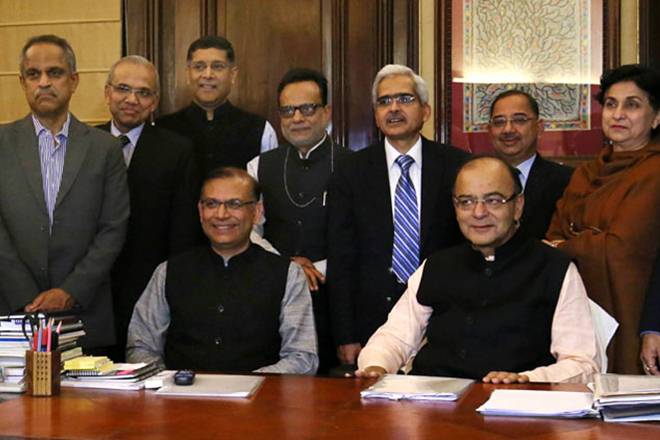Due to demonetisation, forecasting budget numbers will be a challenge; here’s why
The Financial Express
By M Govinda Rao
December 31, 2016 6:40 AM
Although the developments during the first seven months of the fiscal year are similar to the situation that prevailed in earlier years.

Although the developments during the first seven months of the fiscal year are similar to the situation that prevailed in earlier years. (Source: IE)
As the year draws to a close, there is lack of clarity on the emerging nature of fiscal situation. Although the developments during the first seven months of the fiscal year are similar to the situation that prevailed in earlier years, the structural break in the economy brought about by the invalidation of selected bank notes has made it difficult to make predictions on how the year will end.
The progress of implementation of the budget reported by the Controller General of Accounts is available until the end of October 2016. With both revenues and expenditures keeping the same pattern as was seen last year, the government has broadly followed the trend in fiscal and revenue deficits as in the past. In any case, it does not make much sense to analyse the deficit numbers until the end of the year as, in a cash accounting system, the government does a lot of adjustments during the last month to comply with the targets.
The pattern of revenue collections and expenditures incurred during the seven months of the current fiscal shows a pattern similar to other years. Both total revenue receipts and tax revenues during this period were about 50% of the budget estimates, which is broadly similar to the pattern last year. In the case of expenditures too, the progress in aggregate spending until end-October, was about the same as last year. However, the major difference is that while the actual spending on the revenue account until end-October, at about 59%, was higher than last year (55.5%), capital expenditure has lagged. This is explained by the fact that the implementation of Pay Commission recommendations has resulted in higher revenue expenditures this year. As regards capital expenditure, there was considerable front-loading last year which is not seen in the current fiscal. As it is, the budgeted capital expenditure this year, at about 1.6% of GDP, is very low and the slow progress in its implementation has not helped revive the economy. With both private and public investments growing at a slow pace, the major driver of GDP growth continues to be private consumption.
It is in this respect that demonetisation is a cause for worry. The immediate impact of demonetisation has been to compress private consumption, even if temporarily, as transactions became difficult for want of cash in hand. Private consumption has been the only important source of growth in recent times, as both public and private investments have been sluggish and public consumption, too, is constrained by lack of fiscal space. At this point of time, it is too early to estimate the extent of deceleration. Sectors like trade, tourism, transport, small scale manufacturing and construction are likely to slow down considerably.
It is difficult to predict the course of fiscal development for the whole year, due to the structural breakthrough brought about by the invalidation of selected bank notes. As far as tax revenues are concerned, the voluntary disclosure scheme has not brought in the expected bonanza and its second incarnation, too, may not yield much. At the same time, slowdown in the economy and compressed consumption could result in lower-than-budgeted direct and indirect tax revenues. There will be difficulties also in realising the non-tax revenues as well as non-debt capital receipts. Indeed, if the income tax department is able to follow the audit trail created by demonetisation and, armed with more and better information, goes after the doubtful cases aggressively, they may be able to collect more revenues; but that may happen mostly in the next year. As regards expenditures, perhaps, the government will have to spend more than the budgeted amount in view of the coming elections, primarily in Uttar Pradesh and Punjab, early next year.
It is too early to predict the course of fiscal and revenue deficits. If the deposits of invalid notes are substantially lower than their circulation, it may provide sufficient fiscal room. There is still no clarity on the total value of invalidated currency. It is speculated that of the R15.3 trillion invalidated currency, over R14 trillion has already been deposited. This implies that the value of demonetised currency not being deposited may not be large.
Nevertheless, to the extent that the money does not come back to RBI, its liability will stand extinguished and it can either extinguish government securities of equivalent amount; or create seigniorage to match the higher assets position; or use it to recapitalise the public sector banks. In fact, the finance minister is likely to use any additional resources to comply with the fiscal deficit target. The FM cannot risk further erosion by slipping on the deficit numbers.
All in all, it is difficult to predict how the New Year will unfold and how the fiscal situation will emerge. There will be a few added dimensions to the already existing problems. Forecasting the budget numbers will be a challenge due to the structural break and the government will have to take a view on it. Clarity on fiscal targets is possible only after the FRBM Committee submits its report and the government considers it. It is, by now, almost clear that the GST may not be implemented in April, and that makes projection of revenues that much more difficult. The most important challenge, however, is to make substantial allocation to investment expenditures while adhering to fiscal consolidation.